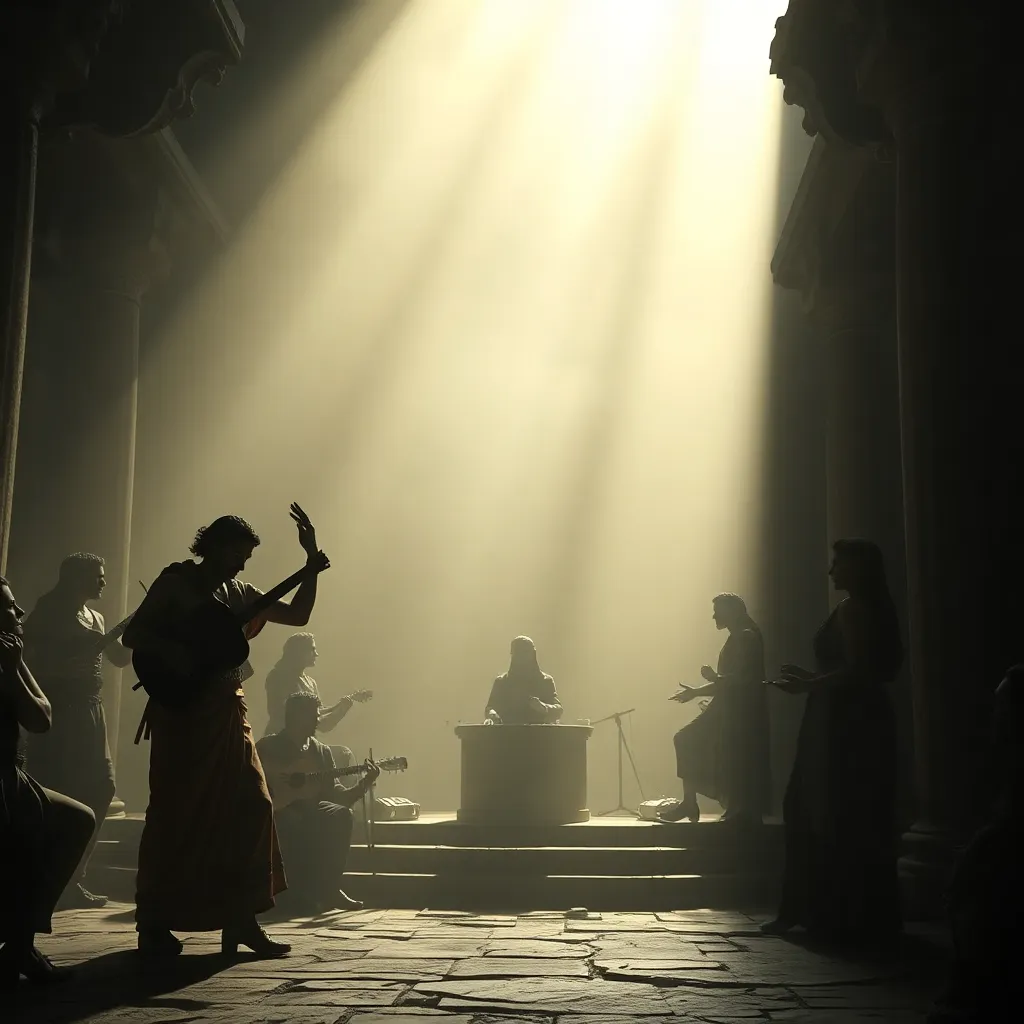The Underworld’s Influence on Ancient Greek Music and Performance
I. Introduction
Ancient Greek music and performance were integral parts of the cultural and religious life of the society. Music was not merely entertainment; it was a vital medium for expressing emotions, communicating with the divine, and marking important life events. Among these, the Underworld holds a significant place in Greek mythology, representing the realm of the dead and the afterlife.
The Underworld, governed by Hades and populated by various mythological figures, influenced countless aspects of Greek culture, including music. This article explores how the themes and narratives of the Underworld shaped musical expression and performance in ancient Greece.
II. The Mythological Landscape of the Underworld
The Underworld in Greek mythology is a complex and multifaceted realm. It is often depicted as a shadowy place beneath the earth, where souls go after death. The Underworld is not merely a destination but a significant aspect of the Greek worldview regarding life, death, and the afterlife.
Key figures associated with the Underworld include:
- Hades: The god of the Underworld, ruling over the deceased.
- Persephone: The queen of the Underworld, who spends part of the year above ground, symbolizing the cycle of life and death.
- Orpheus: A legendary musician whose journey to the Underworld exemplifies the power of music.
The Underworld plays a critical role in Greek cultural narratives, often serving as a backdrop for themes of loss, redemption, and the quest for understanding the mysteries of death.
III. The Role of Music in Greek Rites and Rituals
Music was an essential element in various Greek rites and rituals, particularly those associated with life transitions and the afterlife. It served as a tool for communication with the divine, as well as for expressing the emotions tied to these significant moments.
Funeral rites, for instance, were steeped in musical traditions. Music in mourning served several purposes:
- To honor the deceased and celebrate their life.
- To provide comfort to the grieving family and community.
- To facilitate the soul’s journey to the Underworld.
The connection between music and the afterlife was evident in burial practices, where songs and hymns were often performed to guide the deceased and ensure their peaceful transition into the Underworld.
IV. Orpheus: The Archetype of Music in the Underworld
The myth of Orpheus is a poignant illustration of the intersection between music and the Underworld. Orpheus, a legendary musician and poet, is best known for his descent into the Underworld to retrieve his beloved wife, Eurydice. His enchanting music captivated Hades and Persephone, allowing him to temporarily bring Eurydice back to the land of the living.
Orpheus’s portrayal as a musician emphasizes the transformative power of music, capable of moving even the hearts of the dead. His story has had a profound impact on subsequent musical traditions, inspiring countless works in literature, opera, and modern music.
V. Musical Instruments and Their Symbolism
In ancient Greece, specific musical instruments were associated with the Underworld and the themes of death and remembrance. Notable instruments include:
- Lyre: Often linked to Orpheus, the lyre symbolizes harmony and the connection between the earthly and divine.
- Aulos: A double-reeded instrument, the aulos was used in various rituals, including funerary ones, to evoke emotions tied to loss and the afterlife.
The symbolism of sound in these contexts reflects the emotional weight of mourning and remembrance, with music serving as a bridge between the living and the dead.
VI. The Influence of Underworld Themes in Greek Drama
Greek drama, both tragedy and comedy, often explored themes related to the Underworld. The interplay of music and theatrical performance served to enhance these narratives, allowing audiences to engage deeply with the emotional and moral complexities of the stories being told.
Music played a crucial role in ancient Greek theater, often reflecting Underworld themes through:
- Choral odes that lamented death or celebrated life.
- Musical interludes that heightened the emotional stakes of the narrative.
Notable works that illustrate these themes include:
- “The Bacchae” by Euripides, which explores the duality of life and death through the lens of Dionysian celebration.
- “The Frogs” by Aristophanes, which humorously addresses the nature of artistic inspiration and the afterlife.
VII. The Legacy of Underworld Influence on Later Musical Traditions
The influence of the Underworld extended beyond ancient Greece, shaping musical and performance traditions in subsequent cultures. In Roman music and performance, themes of the Underworld were prevalent, often echoing the Greek narratives.
As time progressed, Underworld themes continued to resonate in medieval and Renaissance music, with compositions reflecting the ongoing fascination with death and the afterlife. Modern interpretations and adaptations of ancient Greek music and myth further highlight the enduring legacy of these themes, often reimagining them for contemporary audiences.
VIII. Conclusion
In summary, the Underworld’s influence on ancient Greek music and performance is a rich and multifaceted subject. From the mythological landscape to the practical applications of music in rituals and drama, the connection between the Underworld and musical expression is profound.
The enduring significance of the Underworld in shaping Greek music and performance reflects a broader cultural understanding of life, death, and the human experience. Ultimately, the intersection of mythology and cultural expression in ancient Greece provides valuable insights into the ways in which the ancient Greeks understood their world and the mysteries beyond.




